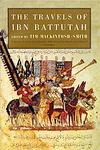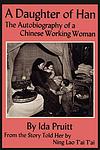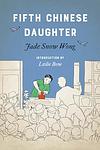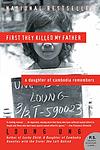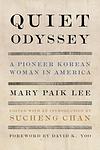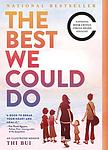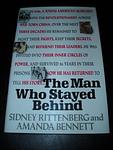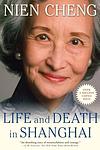The Greatest "Autobiography, Asian History" Books of All Time
Click to learn how this list is calculated.
This list represents a comprehensive and trusted collection of the greatest books. Developed through a specialized algorithm, it brings together 300 'best of' book lists to form a definitive guide to the world's most acclaimed books. For those interested in how these books are chosen, additional details can be found on the rankings page.
Genres
Autobiography is a literary genre that focuses on the life story of the author. It is a first-person account of the author's experiences, thoughts, and emotions, often including significant events and milestones that have shaped their life. Autobiographies can be written by anyone, from famous public figures to ordinary people, and can cover a wide range of topics, including personal growth, career achievements, struggles, and relationships. This genre provides readers with a unique insight into the author's life and perspective, making it a popular and engaging category of books.
Asian History is a category of books that focuses on the historical events, cultures, and societies of Asia. This category includes books that cover a wide range of topics, including the ancient civilizations of China, Japan, and India, the rise and fall of empires, the impact of colonialism, and the modernization of Asian countries. It also includes books that explore the social, political, and economic changes that have shaped the region over time. Overall, Asian History provides readers with a comprehensive understanding of the rich and diverse history of Asia.
Countries
Date Range
Reading Statistics
Click the button below to see how many of these books you've read!
Download
If you're interested in downloading this list as a CSV file for use in a spreadsheet application, you can easily do so by clicking the button below. Please note that to ensure a manageable file size and faster download, the CSV will include details for only the first 500 books.
Download-
1. Wild Swans: Three Daughters of China by Jung Chang
This book is a biographical account of three generations of women in China, spanning the years 1909 to 1991. The narrative follows the lives of the author's grandmother, a warlord's concubine; her mother, a high-ranking official in the Communist Party; and the author herself, who grew up during the Cultural Revolution before moving to the West. The book presents a vivid portrayal of the political and social changes in China during the 20th century, as seen through the eyes of these three women.
-
2. Seven Years in Tibet by Heinrich Harrer
This book is a travel memoir that recounts the author's escape from a British internment camp in India during World War II and his subsequent journey through the Himalayas to Tibet, where he becomes a tutor and friend to the Dalai Lama. The book provides a detailed account of Tibetan culture, customs, and the political turmoil leading up to the Chinese invasion, as seen through the eyes of a foreigner who spent seven years living there.
-
3. Travels (Ibn Battúta) by Ibn Battúta
The book is a comprehensive travelogue written by a 14th-century Moroccan scholar and explorer who traveled extensively across the known world, from Africa to the Middle East, India, China, and Europe. The author shares his observations and experiences in vivid detail, offering unique insights into the diverse cultures, religions, and societies he encountered during his journeys. His accounts serve as a significant historical record of the world during the Middle Ages, providing a firsthand perspective of life during that period.
-
4. Guests Of The Sheik by Elizabeth Warnock Fernea
The book is an autobiographical account of a young American woman's experience living in a small Iraqi village in the late 1950s. As the wife of an anthropologist, she immerses herself in the local culture, particularly the lives of the women, navigating the complexities of gender roles, traditions, and the veil. The narrative offers an intimate glimpse into the domestic lives, social customs, and familial bonds of the villagers, while also reflecting on the author's own cultural assumptions and the process of cross-cultural understanding. Through her journey, the author gains a deeper appreciation for the community's way of life and confronts the challenges of being an outsider in a tightly-knit society.
-
5. The Confessions Of Lady Nijo by Lady Nijo
This book is a candid autobiographical account of a Japanese woman who lived during the Kamakura period. Initially serving as a concubine to the Emperor, she later becomes a wandering Buddhist nun. Her narrative provides a unique insight into the court life of the time, detailing her intimate experiences, political intrigues, and the societal expectations of women. Her journey from the luxuries of the imperial court to the ascetic life of a nun offers a poignant exploration of love, spirituality, and personal transformation, reflecting the complex interplay between the secular and religious life in medieval Japan.
-
6. A Daughter Of Han: The Autobiography Of A Chinese Working Woman by Ning Lao Tai-Tai, told to Ida Pruitt
This book provides a personal account of a woman's life in late 19th and early 20th century China, as she navigates the complexities of poverty, tradition, and societal upheaval. Through her eyes, readers experience the struggles of the lower classes, particularly for women, in a rapidly changing society. Her story is one of resilience and determination, as she confronts challenges such as opium addiction in her family, the death of her children, and the need to work as a servant and street peddler. Her narrative offers a vivid portrayal of the customs, family life, and social hierarchies of her time, providing a valuable historical perspective on the life of an ordinary woman in China.
-
7. Fifth Chinese Daughter by Jade Snow Wong
This autobiographical account provides a vivid portrayal of Chinese-American life in the early 20th century through the eyes of a young girl growing up in San Francisco's Chinatown. The narrative follows her journey as she navigates the complexities of traditional Chinese family values and the American way of life, striving for educational and personal independence. The protagonist's struggle to reconcile her dual cultural heritage is compounded by her ambitions, as she seeks to assert her identity and pursue her dreams amidst the expectations of her family and community. Her story is one of resilience and self-discovery, offering insight into the immigrant experience and the challenges of cultural assimilation.
-
8. Memoirs Of A Korean Queen by Lady Hyegyeong
This historical memoir, penned by an 18th-century Korean royal, provides a deeply personal account of court life in the Joseon Dynasty. The author, born into an aristocratic family, was married at a young age to the ill-fated Crown Prince, and her narrative offers a unique perspective on the political intrigues, familial strife, and tragic events that led to her husband's execution. Her writing not only chronicles her own suffering and resilience but also serves as a poignant historical document, shedding light on the complexities of palace politics and the societal norms of her time.
-
9. Nisei Daughter by Monica Itoi Sone
This memoir provides a poignant account of a second-generation Japanese American woman's life before, during, and after World War II. It explores her childhood in Seattle's vibrant Nihonmachi, her family's forced relocation to an internment camp following the attack on Pearl Harbor, and the challenges of rebuilding life in a post-war America rife with anti-Japanese sentiment. Through personal anecdotes and reflections, the narrative delves into themes of identity, resilience, and the struggle for acceptance, offering a deeply personal glimpse into the impact of historical events on individual lives and the Japanese American community.
-
10. Falling Leaves by Adeline Yen Mah
"Falling Leaves" is a heartbreaking autobiography that recounts the life of a young girl who grows up in a wealthy but abusive family in 20th century China. Despite being the daughter of a prosperous businessman, she is treated as an outcast and blamed for her mother's death, who died shortly after her birth. The story portrays her struggle for acceptance and love within her family, her journey through the cultural revolution in China, and her eventual success as a physician in the U.S. It's a poignant exploration of the themes of familial bonds, resilience, and the human spirit's ability to overcome adversity.
-
11. First They Killed My Father: A Daughter of Cambodia Remembers by Loung Ung
This memoir recounts the author's experiences as a young girl in Cambodia during the Khmer Rouge regime. She is forced from her home in Phnom Penh to a labor camp in the countryside along with her family, where they face starvation, disease, and brutality. The book details her survival through the genocide, her eventual escape to Thailand, and finally her immigration to the United States. It is a powerful story of resilience, courage, and the human spirit's ability to overcome overwhelming adversity.
-
12. Quiet Odyssey by Mary Paik Lee
This book is a poignant memoir that chronicles the life of a Korean immigrant family in early 20th-century America. Through the lens of a young girl, the narrative unfolds the hardships, discrimination, and poverty they faced while maintaining their dignity and striving for a better life. The family's journey from a tumultuous homeland to an uncertain future in the United States is marked by resilience and perseverance, as they navigate cultural barriers and the constant struggle to assimilate while preserving their identity. This personal account provides a unique perspective on the broader Asian American experience during a time of significant social and political change.
-
13. The Road Through Miyama by Leila Philip
The book is a memoir that recounts the author's experience living in the rural Japanese village of Miyama, where she apprenticed with a traditional potter. Immersing herself in the rhythms of rural life and the demanding discipline of pottery, she navigates cultural barriers and finds a deep connection to the landscape and its people. Through her journey, the author explores themes of tradition, craftsmanship, and the intricate relationship between human endeavor and the natural world, all while painting a vivid portrait of a community holding onto its heritage amidst modernity.
-
14. Daughter Of Persia: A Woman's Journey From Her Father's Harem Through The Islamic Revolution by Sattareh Farman-Farmaian
This memoir recounts the extraordinary life of a woman born into a privileged family in early 20th-century Iran, who witnessed the dramatic shifts of her country's social and political landscape. Growing up in a polygamous household, she broke with tradition to pursue an education abroad, later returning to Iran to become a pioneering advocate for social reform and women's rights. Her story spans the rise and fall of the Pahlavi dynasty, the advent of the Islamic Revolution, and her subsequent exile, offering a personal lens on Iran's complex history and the role of women within it. Through her journey, she embodies the struggles and resilience of a nation in the face of modernity and change.
-
15. Burmese Looking Glass by Edith Mirante
The book is a gripping memoir that chronicles the author's daring travels and activism in Burma (Myanmar) during the 1980s. It delves into the complex political landscape of the country, highlighting the struggles of ethnic minorities and the brutality of the military regime. The author's journey is both a personal quest and a political mission, as she ventures into rebel-held territories, witnesses human rights abuses, and works to bring international attention to the plight of the Burmese people. Her narrative weaves together adventure, compassion, and a deep commitment to justice, offering a unique perspective on a nation fraught with conflict and the resilience of its people.
-
16. Slowly Down The Ganges by Eric Newby
This travelogue recounts the author's adventurous journey down the Ganges, one of the great rivers of the Indian subcontinent. With humor and keen observation, the narrative captures the diverse landscapes and vibrant cultures encountered along the riverbanks. Through a series of mishaps, challenges, and encounters with local inhabitants, the author paints a vivid picture of life in India, reflecting on its history, religion, and the profound significance of the river to the people who live along its course. The book is as much a personal quest as it is an exploration of a place and its people, offering insights into the complexities of a rapidly changing country while navigating the waters of one of its most sacred rivers.
-
17. An Area Of Darkness by V. S. Naipaul
The book is a travelogue that delves into the author's journey through India, a country that is both his ancestral homeland and a place of discovery for him. Through a series of vivid observations and encounters, the narrative explores the complexities, contradictions, and profound cultural richness of India. The author grapples with the legacies of colonialism, the challenges of modernity, and his own personal search for identity. The text is characterized by its introspective and often critical perspective, offering a portrait of a nation at a crossroads and a writer's quest to understand his own heritage.
-
18. From A Chinese City by Gontran de Poncins
In this travelogue, the author offers an intimate glimpse into the daily life and culture of a pre-World War II Chinese city, far removed from Western influence. Through vivid descriptions and personal anecdotes, the narrative captures the essence of the city's streets, its people, and their traditions, painting a rich tapestry of local customs, beliefs, and the social dynamics of the time. The author's journey not only explores the physical spaces of the city but also delves into the philosophical and spiritual undercurrents that define the heart of its civilization, providing a unique and timeless insight into a way of life that stands at the crossroads of change.
-
19. The Best We Could Do: An Illustrated Memoir by Thi Bui
This illustrated memoir captures the story of a Vietnamese family who fled to America after the fall of South Vietnam in the 1970s. The narrative traces their journey and struggles as refugees, while also delving into the family's complex history and relationships. The author uses her own experiences as a new mother to explore themes of parenthood, identity, and the enduring effects of displacement and trauma.
-
20. Iron & Silk by Mark Salzman
This book is a memoir that recounts the experiences of an American teacher and martial artist who spends two years in China during the early 1980s. The narrative delves into the cultural exchanges and misunderstandings between East and West as the author teaches English and studies kung fu with master practitioners. Through a series of vignettes, the memoir paints a portrait of a China still recovering from the Cultural Revolution, exploring themes of connection, tradition, and the nuances of human relationships across a vast cultural divide. The author's journey is one of self-discovery, as he navigates the complexities of life in a foreign land, building friendships and gaining insights into the subtleties of Chinese culture and society.
-
21. The Silent Steppe: The Story Of A Kazakh Nomad Under Stalin by Mukhamet Shayakhmetov
"The Silent Steppe: The Story Of A Kazakh Nomad Under Stalin" is a gripping memoir that chronicles the life of a Kazakh nomad during the brutal reign of Stalin. The book offers a firsthand account of the hardships, persecution, and forced collectivization experienced by the Kazakh people under Soviet rule. Through the eyes of the author, readers gain insight into the resilience, traditions, and struggles of the Kazakh nomadic culture in the face of political oppression.
-
22. The Man Who Stayed Behind by Sidney Rittenberg
This book is the remarkable memoir of an American who became deeply involved in the Chinese Communist movement from the 1940s through the 1970s. Initially arriving in China as a U.S. Army interpreter during World War II, he chose to stay in the country after the war ended, drawn by the promise of the Communist Revolution. Over the years, he became a close associate of key revolutionary leaders, including Mao Zedong, and played a significant role in the Communist Party's propaganda efforts. Despite his deep commitment to the cause, he faced suspicion and was imprisoned twice for a total of 16 years on charges of espionage. The narrative provides a unique insider's perspective on the Chinese Communist Revolution, the Cultural Revolution, and the complexities of being a foreigner deeply embedded in one of the most significant political movements of the 20th century.
-
23. Life And Death In Shanghai by Nien Cheng
"Life and Death in Shanghai" is a compelling memoir by a woman who was imprisoned during China's Cultural Revolution. The narrative recounts her harrowing six-and-a-half-year experience in solitary confinement, where she was subjected to brutal interrogations and endured immense psychological and physical torment. Despite the harsh conditions, she maintained her innocence and resisted the pressures to confess to false charges of espionage. The book not only provides a personal account of survival and resilience but also serves as a poignant critique of the political turmoil and ideological fanaticism that characterized the era, offering deep insights into the cultural and historical context of the time.
-
24. Hiroshima Diary by Michihiko Hachiya
The book is a poignant and detailed personal account of the aftermath of the atomic bombing of Hiroshima, as recorded by a Japanese physician who survived the attack. The diary entries begin on August 6, 1945, the day Hiroshima was bombed, and continue for several weeks. Through his observations and experiences, the author provides a deeply human perspective on the devastation and suffering endured by the victims, as well as the immense challenges faced by the medical community. His writings not only document the physical and emotional toll of the nuclear attack but also reflect on the resilience and compassion that emerge amid such profound tragedy.
-
25. Baburnama by Zahir Uddin Muhammad Babur
The book is a personal memoir and historical narrative written by a 16th-century Central Asian ruler who founded the Mughal Empire in South Asia. It vividly chronicles his life, including his struggles and conquests, as well as his observations on the diverse cultures, flora, and fauna of the regions he encountered during his reign. The text is notable for its candid and introspective style, providing a rare and valuable perspective on the period's political and social dynamics, as well as the personal thoughts and emotional life of a ruling monarch.
Reading Statistics
Click the button below to see how many of these books you've read!
Download
If you're interested in downloading this list as a CSV file for use in a spreadsheet application, you can easily do so by clicking the button below. Please note that to ensure a manageable file size and faster download, the CSV will include details for only the first 500 books.
Download

